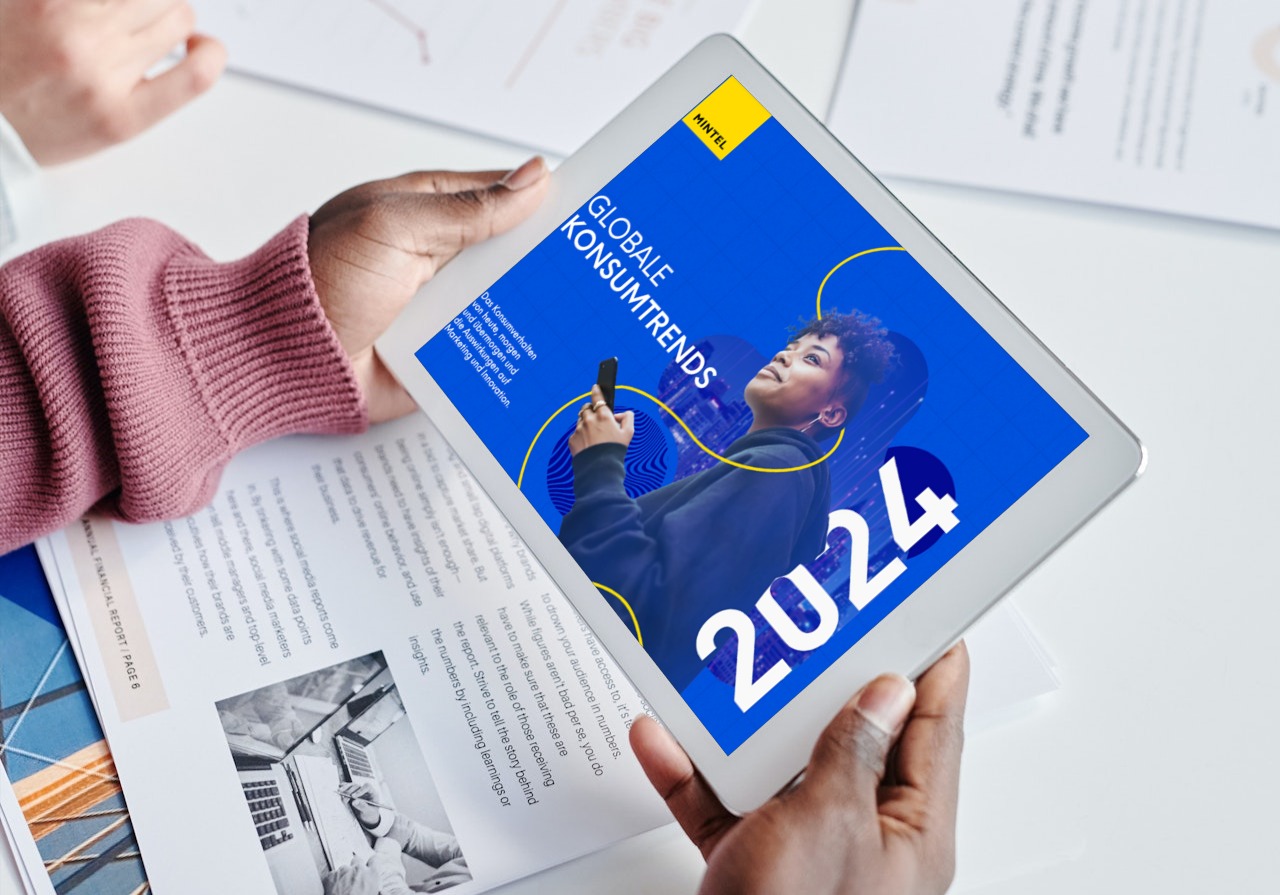Key Takeaways From the Mintel Global Consumer Trends 2024 Report
Written by
Kinga EdwardsPublished on
Global consumer trends refer to the patterns and behaviors exhibited by consumers on a worldwide scale. Read what to pay attention to in 2024!

Our world is changing fast with new technology, but people still want real connections. The Mintel Global Consumer Trends 2024 report looks at how consumers are balancing digital tools and human touch. This year, we see that people care a lot about being real, sustainable, and connected. Understanding these trends helps companies build strong, trustful relationships with their customers. Read our post with key takeaways from the Mintel report (you’ll find a link to download it at the bottom of this article!).
Human Connection in a Digital World
Despite the rise of AI and digital technologies, there is a growing emphasis on maintaining human skills and emotional connections. Consumers are increasingly seeking genuine human interactions to balance the dominance of algorithms and automation.
Human interaction remains a key element for a positive customer experience.
The balance between embracing technological advancements and preserving human traditions is extremely important. Consumers appreciate the efficiency of technology but crave the authenticity of craftsmanship.
Balancing technology with real life is a big thing, and comes down to:
- parental concerns: 72% of Canadian parents worry about their children having too much access to digital media, including screen time and appropriate content, and a lack of parental control.
- reality vs. virtual: 65% of consumers in Singapore fear that spending too much time in the metaverse might lead to losing touch with reality.
- human interaction: 58% of U.S. consumers believe that communication with a real person makes interactions in sales or customer service more enjoyable.

Redefining Value and Corporate Accountability
Consumers are reassessing what constitutes value beyond just price. Quality, sustainability, and emotional connections are becoming more important. Companies need to align their products and messaging with these evolving definitions of value.
And, actually, companies and consumers must collaborate to tackle global challenges. As part of this, we need to collaborate on sustainability, ethics, and foster a sense of community outside the traditional family unit.
They are also increasingly valuing natural ingredients in beauty products and are willing to invest more in quality items that promise longevity.
Consumers globally expect companies, especially those in the beauty and personal care sectors, to take significant responsibility for sustainability efforts and be transparent about their practices.
The data speaks for itself here.
- 70% of Thai consumers are interested in beauty products with natural ingredients and are willing to pay more for them.
- 67% of British consumers who bought furniture in the last 12 months prefer to spend more on high-quality furniture that lasts longer rather than on cheaper options that need frequent replacement.
Retailers’ private label products greatly influence the quality perception of their overall brands, which is why maintaining high standards is essential.
The climate crisis demands more than just sustainable practices; it requires proactive, innovative solutions from companies. Sustainability is no longer a marketing buzzword but a crucial component of survival and consumer trust.
Consumers appreciate practical guidance on how to care for products sustainably, showing a demand for actionable advice from companies.
Clear and understandable communication about sustainability practices is crucial, as vague and complex definitions can deter consumers from making eco-friendly purchases.
This shift is evident as consumers demand greater transparency and authenticity from brands, particularly regarding sustainability efforts. For example, 60% of U.S. consumers are skeptical of corporate sustainability claims, emphasizing the need for companies to demonstrate genuine and measurable actions.

This demand for authenticity extends to the communication of sustainability practices, where clarity and honesty are paramount.
For instance, 52% of German consumers express distrust in companies’ environmental claims, pointing to a widespread skepticism that companies must address. By focusing on adaptive innovations and long-term planning, companies can stay relevant and trustworthy in the face of dynamic consumer needs and environmental challenges.
Consumers are looking for brands that provide not just physical products but also emotional and spiritual support. Companies that create spaces for relaxation, mindfulness, and personal growth can help consumers navigate the complexities of modern life. This holistic approach to consumer engagement emphasizes the importance of human-centric, sustainable, and transparent practices in building strong, lasting relationships in an ever-changing global landscape.
Strengthen Consumer-Company Connections
The connection between consumers and companies has never been more crucial. The perception of store brands plays a significant role in this relationship, with 78% of U.S. consumers believing that the quality of a retailer’s private label reflects the overall quality of the retailer.
This statistic underscores the need for retailers to maintain high standards in their private labels to build and retain consumer trust.
Additionally, consumer interest in engaging brand stories is on the rise. For example, 30% of Chinese consumers with luxury cars worth 300,000 RMB or more are drawn to companies that offer interesting and engaging narratives. This interest highlights the importance of storytelling in marketing strategies.
Amid economic instability and geopolitical tensions, consumers seek brands that offer honest and practical solutions to tackle these uncertainties. Authentic communication and reliable products are key to building consumer confidence and fostering long-lasting relationships. As consumers prioritize transparency, companies must move beyond superficial engagements and focus on genuine, value-driven interactions. Companies can create lasting value by addressing these evolving needs.
52% of German consumers do not believe companies are honest about their environmental impacts.
Genuine, meaningful relationships are prioritized for mental and physical well-being. Consumers are looking for deeper connections and new forms of intimacy, which impacts their engagement with brands and products.
Managing Technological Advancements with Consumer Empowerment & Trust
There is a shift towards consumer empowerment through technology.
In an era where consumer empowerment is on the rise, transparency and authenticity have become critical components of business success. Consumers are increasingly seeking control over their interactions and expect technology to enhance, not replace, human connections.
As technology continues to integrate into daily life, its impact on consumer behavior and preferences is profound. While there is optimism about the productivity benefits of technology, with 48% of German consumers believing it can positively impact productivity, there are also significant concerns.

For instance, 47% of British consumers worry that increased interactions with AI might reduce human connections, especially in critical services like customer support and emergency assistance. This concern highlights the need for a balanced approach to technology adoption.
Consumers are looking for brands that can navigate this technological landscape responsibly. Additionally, 25% of Japanese consumers express a desire to improve their lives through digital technology, indicating a clear interest in leveraging technological advancements for personal growth.
Companies must prioritize transparency and ethical use of technology to maintain consumer trust and ensure that technological benefits are realized without compromising human interaction. By addressing both the opportunities and challenges of technological advancements, companies can foster a sense of control and connection among consumers.
Transparency in business practices, especially regarding sustainability, is critical. Consumers are skeptical of greenwashing and demand concrete, measurable actions from companies.
Numbers also reflect aspects such as:
- Reality check. The potential of losing connection with reality due to excessive time spent in virtual environments like the metaverse is a widespread concern.
- Technological optimism and skepticism. While there is optimism about the productivity benefits of technology, there are also significant concerns about the societal and personal impacts of AI.
- Digital life enhancement: There is a clear interest among consumers, particularly in Japan, to leverage digital technologies to enhance their daily lives.
Emphasizing Social Connections
Social connections play a vital role in enhancing personal well-being, a trend that has been magnified in the wake of the pandemic.
For instance, 66% of Brazilian consumers spend time with loved ones to reduce stress, underscoring the importance of personal relationships in managing mental health.

As consumers look to rebuild their social lives post-pandemic, companies have an opportunity to facilitate these connections. Interestingly, 23% of British people say they have started doing their regular social activities again, just like they did before the pandemic. This shows that many people really want to spend time with others and get back to normal life.Brands that create products and experiences promoting social engagement can significantly enhance consumer loyalty and satisfaction. This focus on community and social well-being aligns with the broader trend of holistic health, where emotional and relational aspects are integral to overall wellness. By fostering environments that encourage social interactions, companies can create meaningful and lasting connections with their consumers.
In seeking connections, the consumers rely on:
- Healthy habits. 67% of Thai consumers find it easier to maintain healthy habits when doing so with other people rather than alone.
- Social leisure. 62% of U.S. consumers prefer to spend their leisure time with friends or family rather than alone.
- Shared activities. 48% of British consumers who engaged in leisure activities in the past month chose activities that they could do well with friends or family.
What’s for you in this report?
The Mintel Global Consumer Trends 2024 report shows that people value both technology and human connection.
Consumers want brands to be honest and care about the environment. And companies that mix digital tools with personal touch can create stronger bonds with their customers.
It is even more essential nowadays that businesses meet the needs of modern consumers by offering high-quality, genuine, and clear products and services. The challenge is to make sure technology helps, not replaces, our human connections. Get more insights by reading the full report here!
And if you’re hungry for more knowledge, subscribe to our newsletter for more industry insights.


